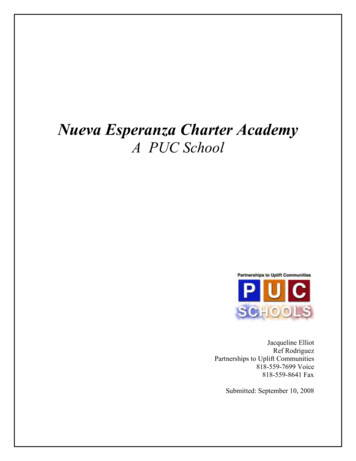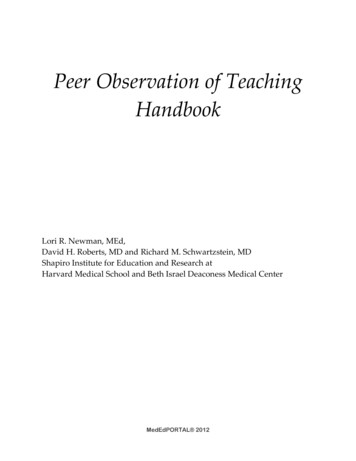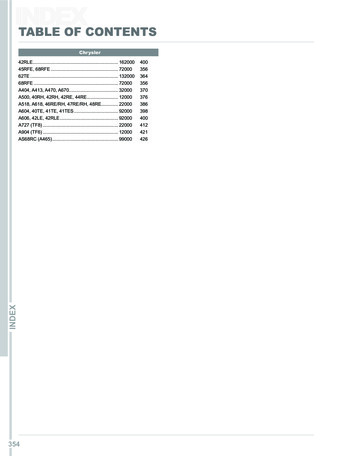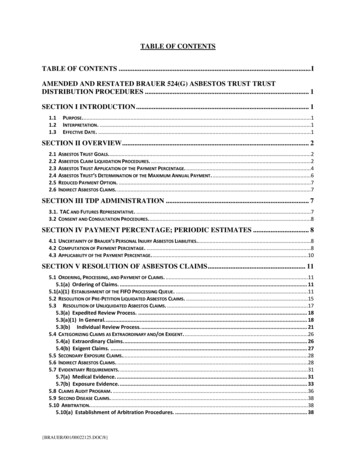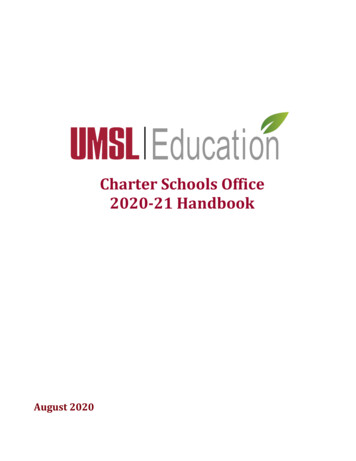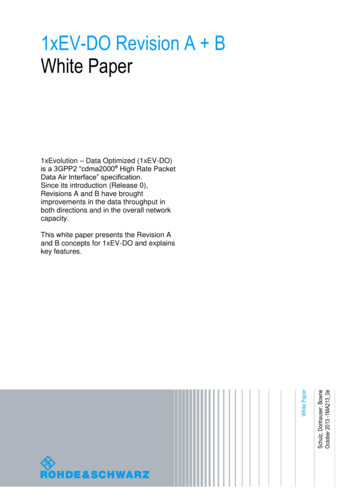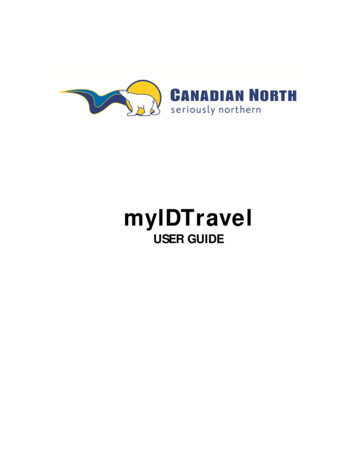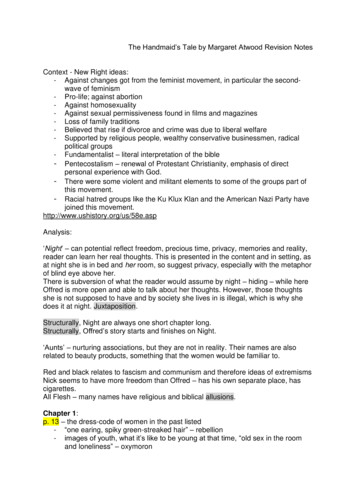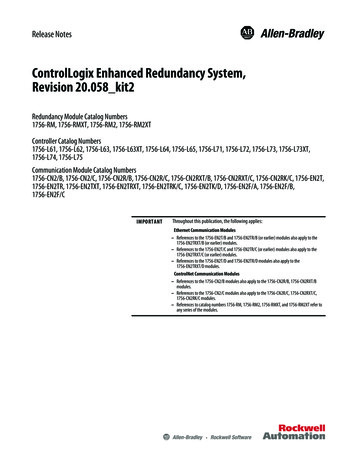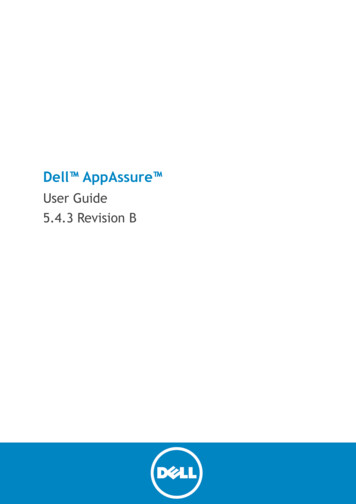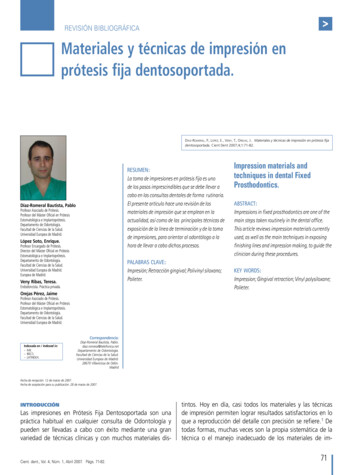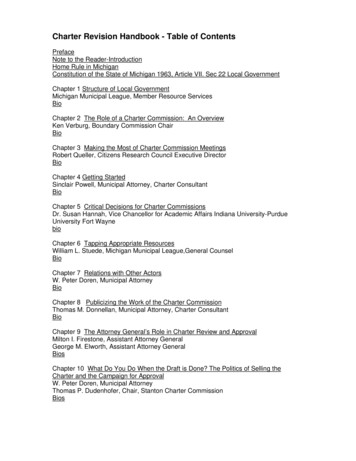
Transcription
Charter Revision Handbook - Table of ContentsPrefaceNote to the Reader-IntroductionHome Rule in MichiganConstitution of the State of Michigan 1963, Article VII. Sec 22 Local GovernmentChapter 1 Structure of Local GovernmentMichigan Municipal League, Member Resource ServicesBioChapter 2 The Role of a Charter Commission: An OverviewKen Verburg, Boundary Commission ChairBioChapter 3 Making the Most of Charter Commission MeetingsRobert Queller, Citizens Research Council Executive DirectorBioChapter 4 Getting StartedSinclair Powell, Municipal Attorney, Charter ConsultantBioChapter 5 Critical Decisions for Charter CommissionsDr. Susan Hannah, Vice Chancellor for Academic Affairs Indiana University-PurdueUniversity Fort WaynebioChapter 6 Tapping Appropriate ResourcesWilliam L. Stuede, Michigan Municipal League,General CounselBioChapter 7 Relations with Other ActorsW. Peter Doren, Municipal AttorneyBioChapter 8 Publicizing the Work of the Charter CommissionThomas M. Donnellan, Municipal Attorney, Charter ConsultantBioChapter 9 The Attorney General’s Role in Charter Review and ApprovalMilton I. Firestone, Assistant Attorney GeneralGeorge M. Elworth, Assistant Attorney GeneralBiosChapter 10 What Do You Do When the Draft is Done? The Politics of Selling theCharter and the Campaign for ApprovalW. Peter Doren, Municipal AttorneyThomas P. Dudenhofer, Chair, Stanton Charter CommissionBios
Resource MaterialI. City1. article: Charter Revision & Amendment2. article: So You Want a New Charter3. article: Nature and Purpose of a Home Rule Charter4. General Subject Areas of a charter5. Mandatory Charter Provisions of the Home Rule City Act6. Municipal Report “Organization of City and Village Government in Michigan”7. Sample Rules of Procedurea) Dewittb) Flintc) Grand Rapids8. Sample Minutesa) DeWittb) East Grand Rapidsc) Parchment9. The Home Rule City Act (PA 279 of 1909) [link to Michigan legislature]10. National Civic League—Model City Charter information [link to national civic league]II. Village1. article: Charter Revision & Amendment2. article: So You Want a New Charter3. article: Nature and Purpose of a Home Rule Charter4. General Subject Areas of a charter5. Mandatory Charter Provisions of the Home Rule Village Act6. Outline of Procedures for Revision of Village Charter under Home Rule Village Act7. Municipal Report “Organization of City and Village Government in Michigan”8. Sample Rules of Procedurea) Dewittb) Flintc) Grand Rapids9. Sample Minutesa) DeWittb) East Grand Rapidsc) Parchment10. The Home Rule Village Act (PA 278 of 1909) [link to Michigan legislature]
PrefaceThis Workbook for Charter Commissioners is the product of the efforts of a committee ofthe Michigan Association of Municipal Attorneys in cooperation with staff of the MichiganMunicipal League, and has involved many individuals who have been active in charterrevision work through the years. The particular focus of the Workbook, and much of thematerial, is drawn from a workshop for charter commissioners held jointly by theAttorneys Association and the League on November 23, 1991.The format of the Workbook will facilitate periodic amendments, as necessary, andparticularly as charter commissioners and others may make suggestions for additionalresources.Michigan municipalities are in a period of charter activism, driven by aging charterswhich are perhaps not wholly adequate to the times and circumstances at the close ofthe 20th and near the 21st century. Approximately 40 cities and villages since 1989 havebeen through or were at some stage in their charter revision process when thisWorkbook was prepared.This current tide of charter revision activity will probably continue into the mid-1990's andpossibly longer. From the 1930’s through the 1960’s most charters were from newmunicipal incorporations. Records show 33 new incorporations in the 1930’s, 33 in the1950’s, and 42 in the 1960’s. The charters written and adopted in those years, nowanywhere from 40 to 70 years ago, are ready for retirement. So there has been a shift incharter activity as the twentieth century closes from new charters of brand new cities tocharter revisions by older cities. This accounts for most of the current charter activity.Charter revision in these municipalities must take into account the accumulated changesin state legislation and intervening court decisions which have made many charterprovisions, once valid in their time, invalid or unenforceable. Many newly electedmembers of municipal governing bodies, and citizens, have wondered about these "deadletter" charter provisions which seem to be so much excess verbiage. In addition,fundamental economic and population changes in many communities have suggestedthe need for a fresh look at fundamental governmental arrangements in home rule cities.Charter revision has reduced the number of cities governed by the Fourth Class CitiesAct (Act 215, P.A. 1895, as amended) as those communities opt for home rule charters.Charter Commissioners Handbook1
The Legislature probably accelerated this trend when it amended the Fourth Class CitiesAct in 1976 to declare them all home rule cities (MCL 81.1(c), effective January 1, 1980.The number of cities governed by the Fourth Class Cities Act as the local charter, nowstands at seven (2003).Another reason for charter activity has been the long term trends in village governmentin Michigan: movement from village to city status, and from general law to home rulevillage status. Until 1998, when the village of Lake Isabella was incorporated, thenumber of home rule villages had not changed in a quarter of a century. However, manyhome rule villages have reincorporated as cities, the Village of Clarkston being the mostrecent example. Many general law villages have opted for their own charters under theHome Rule Village Act (Act 278, P.A. 1908, as amended), and since 1961, 106 villageshave reincorporated as home rule cities with home rule city charters.Finally, townships have incorporated as cities, adding to the number of municipalincorporations and new city charters in recent years. The cities of Auburn Hills (1983)and Rochester Hills (1984) are most recent examples.We hope that this Workbook will be a useful general resource for those now serving aselected charter commissioners, as appointed members of charter study groups, and whoone day may find themselves on such bodies.Special recognition and thanks are due to the members of a focus group of charterconsultants, municipal attorneys, academicians, charter commissioners, and charterstudy committee members who contributed no small part to the events, materials, andthinking that went into this Workbook.1991 Charter Focus Group MembersMr. Robert Fryer, Executive Director, Michigan Municipal LeagueMr. John M Patriarche, Executive Director, Michigan Municipal LeagueRobert Queller, Executive Director, Citizens Research CouncilMr. George Elworth, Michigan Assistant Attorney GeneralMr. Milton Firestone, Michigan Assistant Attorney GeneralCharter Commissioners Handbook2
Mr. Sinclair Powell, municipal attorneyMr. Kenneth VerBurg, Boundary Commission ChairMr. Dennis Day, Chairman Memphis City Charter Advisory CommitteeDr. Susan B. Hannah, Vice-Chancellor for Academic Affairs Indiana University-PurdueUniversity Fort WayneDr. Joe Ohren, Faculty Public Administration/Political Science Dept/ Eastern MichiganUniversityMr. Thomas M. Donnellan, municipal attorney and charter consultantMr. Robert Hegal, charter consultantMr. Dennis McGinty, East Lansing City AttorneyMr. George B. Davis, municipal attorneyMr. Richard A. Wisz, Chairman Hamtramck Charter Revision CommissionProf. Ellis Perlman, Dept Political Science, University of Mich.-FlintAlvan Knot, Lansing City AttorneyDaniel C. Matson, DeWitt City Attorney, charter consultantRonald W. Lowe, Plymouth City AttorneyEric D. Williams, Big Rapids City AttorneyPeter Letzmann, Troy City AttorneyWilliam C. Mathewson, Staff Attorney, MMLWilliam L. Stuede, General Counsel, MMLCharter Commissioners Handbook3
The Charter Revision Handbook was developed from an MML seminar.The presentations have been transcribed as Chapters 2-10.Daniel C. Matson, ModeratorI want to welcome you to what we believe is a Michigan first - a workshop for chartercommissioners--a novel event in our state. The origin of this workshop stems from thejoint effort of the Michigan Association of Municipal Attorneys and the staff of theMichigan Municipal League. The Municipal Attorneys Association is a chartered sectionof the League.There are a number of Michigan communities which are now in the process of revisingtheir charters. By assisting such communities in sharing information about the natureand creation of their fundamental governing documents, the sponsoring organizationsare also attempting to fulfill their own purposes.This workshop is a perception of the future of our communities as viewed throughmunicipal charters. In the 20th century Michigan has had the experience of twoConstitutions and the Home Rule Cities Act. This legal framework presents dramaticopportunities for municipalities to thrive through self-government, principally by thedevice of the home rule charter.We ask you to continually reflect upon how your work as charter commissioners willenhance government in your community in the next century. In your deliberations,please consider what may be essential to good government that may not yet beimplemented in your municipality. There will be need for improvement in certain areaswhich may not have been previously addressed in your existing charters; such asplanning for change, continuing education of officials and staff, ethics, out-of-courtconflict resolution methods, intergovernmental relations, cultural enhancement, includingpromotion of the arts, keeping the public informed, and future charter revisions. Howcreative will you be in this process? What else may your community not presentlyaddress that you envision as a present or future need? Should certain of the mentioneditems be mandated in the municipal charter? Should they be referred to in a preface orpreamble to your charter? Should their benefits be reserved for more casual treatmentby future officials?Charter Commissioners Handbook4
Your commitment as charter commissioners is evidenced by your sacrifice of much timeand sharing of talent, both of which will produce benefits for untold numbers of citizenswithin your communities. You are not alone in this process.The participants in this workshop represent much experience. Your presenters todayinclude learned university professors, charter consultants, experienced chartercommissioners, municipal attorneys, specialists from the Attorney General's office,Michigan Municipal League support staff, and the substantial resources of the League.The materials that you will receive constitute a unique workbook containing the statutoryframework for charters, treatises of Michigan home rule government, on variousimplementing procedures, and a checklist of what must appear in municipal charters. Inaddition, a charter data base is being developed by the Michigan Municipal League. Allof this effort is for your benefit as you engage in the charter adventure.Charter Commissioners Handbook5
Home Rule in MichiganThe doctrine of self-determination, more commonly referred to as “Home Rule” may bedefined as the constitutionally-granted prerogative of political subdivisions of the State tohave control over and to have full responsibility for governmental matters of purely localconcern without interference by the State.The people of the State of Michigan through the Constitutional Convention of 1908, haveconferred such powers on the cities and villages of Michigan. The 45th Legislature of theState of Michigan, and subsequent legislatures, in keeping with the spirit of theConstitution, have adopted enabling legislation which has made possible the practicalapplication of "Home Rule." The Constitution of 1963 reaffirms and strengthens theprinciple of home rule for cities and villages.Cities and villages of Michigan have fully accepted the responsibilities under such grantof power, and the existence of the doctrine of self-determination has been the largestsingle factor in bringing about the high standards which prevail today in municipalgovernment in Michigan.*Excerpt from Statement of Policy on Home Rule in Michigan, Michigan MunicipalLeague, 1972-73.Charter Commissioners Handbook6
Constitution of the State of Michigan 1963Article VII. Sec 22 Local GovernmentCharters, Resolutions, Ordinances; Enumeration of Powers§22. Under general laws the electors of each city and village shall have the power andauthority to frame, adopt and amend its charter, and to amend an existing charter of thecity or village theretofore granted or enacted by the legislature for the government of thecity or village. Each such city and village shall have power to adopt resolutions andordinances relating to its municipal concerns, property and government, subject to theconstitution and law. No enumeration of powers granted to cities and villages in thisconstitution shall limit or restrict the general grant of authority conferred by this section.Charter Commissioners Handbook7
Structure of Local Governmentby Member Resource ServicesThe present status of cities and villages in Michigan is the result of historical tradition, ofthe home rule provisions of the Constitutions of 1908 and 1963, of the home rule acts of1907, and the initiative of individual communities.During the nineteenth century, the state legislature recognized the need to incorporatethe densely settled communities within the basic pattern of counties and townships. Thesystem of local government written into Michigan’s 1908 and 1963 constitutionsrecognized the continuing existence of counties and townships, with the voluntaryincorporation of the more densely settled areas as cities and villages. An innovation inthe 1908 constitution was a provision for city and village home rule charters – a changewhich was to have many repercussions.VillagesThe basic difference between a city and a village is that whenever and wherever an areais incorporated as a village, it stays within the township. The villagers participate intownship affairs and pay township taxes in addition to having their own villagegovernment. Incorporation as a city, however, removes an area from townshipgovernment. City dwellers participate in county elections and pay county taxes as dovillagers but are removed from township units.Villages in Michigan are organized primarily to establish local regulatory ordinances andto provide local services such as fire and police protection, public works and utilities.Certain of the local duties required by the state are not demanded of the village but areperformed by the embracing township including assessing property; collecting taxes forcounties and school districts; and administering county, state and national elections.Most of the villages (213 of 261) are still governed under the General Law Village Act,1895 PA 3 as amended. Charters for villages are the exception, although any villagemay adopt a home rule document under 1909 PA 278, the Home Rule Village Act.Charter Commissioners Handbook: Structure of Local Government8
CitiesA city, being withdrawn from the township, must perform the basic, state-required dutiesas well as its own services. In addition to being responsible for assessing property andcollecting taxes for county and school purposes, the city also becomes solelyresponsible for registration of voters and conduct of all elections within its boundaries.The greater independence of the city, in maintaining local regulations and functions andstate-imposed duties in one integrated unit, accounts for the creation of many smallcities in Michigan during recent decades. The trend has also developed in villages toseek incorporation as cities whereby they achieve a separation of jurisdiction from thetownship.As of January 2003, Michigan had 272 incorporated cities and 261 incorporated villages– a total of 533 municipalities. Of this total number, 312 had adopted home rule charters.In 1895, adoption of the Fourth Class City Act created two types of cities: those of 3,000to 10,000 population, which came under the act, and all others which remained “specialcharter” cities. As of January 2003, all but one of the “special charter” cities havereincorporated as home rule cities. As of January 1, 1980 all fourth class cities becamehome rule cities by virtue of 1976 PA 334 (see also OAG 5525, 7/13/1979), whichcontinued the Fourth Class City Act as the charter for each former fourth class city until itelects to revise its charter. As of January 2003, seven cities continue to be governed bythe Fourth Class City Act.Standards of IncorporationFor incorporation of a home rule village, a population of 150 is the minimum, but theremust be a minimum density of 100 to the square mile. There is no statutory requirementthat a village must become a city when it experiences a rapid growth in population. Onceincorporated, villages may seek reincorporation as fifth class home rule cities, providingtheir population is between 750 and 2,000. Alternatively, they may seek reincorporationas home rule cities if their population exceeds 2,000 with a density of 500 per squaremile. For many years the Home Rule City Act required 2,000 population and density of500 per square mile for city incorporation. A 1931 amendment permitted fifth class cityincorporation at 750 to 2,000 population with the same 500 per square mile densityrequirement, but authorized villages within this range to reincorporate as citiesregardless of density.Charter Commissioners Handbook: Structure of Local Government9
There is no basic difference between a fifth class home rule city and a home rule city,except the population differential and the statutory requirements that fifth class homerule cities hold their elections on an at-large basis. If all the territory of an organizedtownship is included within the boundaries of a village or villages, the village or villages,without boundary changes may be incorporated as a city or cities as provided in 1982PA 457.Unincorporated territory may be incorporated as a fifth class home rule city provided thepopulation ranges from 750 to 2,000 and there is a density of 500 persons per squaremile. The same density rule applies to the incorporation of territory as a home rule city ifthe area has a population of more than 2,000. There are no other methods of cityincorporation today. A new city must be incorporated under the Home Rule City Act.State Boundary CommissionUnder 1968 PA 191, the State Boundary Commission must approve all petitions for cityand village incorporation. The Boundary Commission is composed of three membersappointed by the governor. When the commission sits in any county, the three membersare joined by two county representatives (one from a township and one from a city),appointed by the probate judge.In reviewing petitions for incorporation, the Boundary Commission is guided by certainstatutory criteria: population; density; land area and uses; valuation; topography anddrainage basins; urban growth factors; and business, commercial and industrialdevelopment. Additional factors are the need for governmental services; present statusof services in the area to be incorporated; future needs; practicability of supplying suchservices by incorporation; probable effect on the local governmental units remaining;relation of tax increases to benefits; and the financial capability of the proposedmunicipality (city or village). In other words, the Boundary Commission review centers onthe feasibility of the proposed city or village.After review on the basis of criteria, the Boundary Commission may deny or affirm thepetition. (Affirmative action may include some revision of the proposed boundaries onthe commissio
charter activity as the twentieth century closes from new charters of brand new cities to charter revisions by older cities. This accounts for most of the current charter activity. Charter revision in these municipalities must take into account the accumulated changes in state legislation and intervening cour
